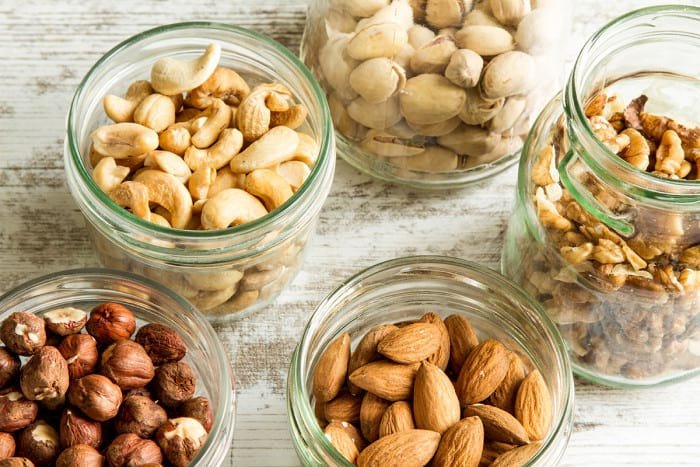
Two analyses from a clinical trial show that people who maintain a healthy lifestyle after surgery and chemotherapy for colon cancer are more likely to have a favorable outcome. One evaluation looked at maintaining healthy habits overall. The other looked specifically at the link between a favorable outcome and eating nuts as a regular part of the diet. The new analyses, led by investigators from Dana-Farber Cancer Institute and conducted in collaboration with Memorial Sloan Kettering’s Leonard Saltz, are being presented at the annual meeting of the American Society of Clinical Oncology.
“This whole series of studies on how lifestyle impacts outcome — of which these two are just the latest — is very empowering to people with cancer,” says Dr. Saltz, Chief of the Gastrointestinal Oncology Service. “My patients always ask me, ‘What else can I do to fight my cancer?’ The answer is that one important thing you can do is adopt a healthy lifestyle.”
The original phase III trial, which was reported by Dr. Saltz in 2007, included more than 1,200 participants. It was designed to test whether adding the drug irinotecan (Camptosar®) to chemotherapy after surgery would extend survival for people with stage III colon cancer. The study did not find any benefit from the additional drug.
As part of that research, participants also completed detailed surveys at three months and at 12 months after surgery. Among the questions asked were those about diet and lifestyle habits, including exercise, smoking, and alcohol and drug use.
Nuts to You: Tree Nuts Associated with Better Outcomes
One of the new analyses focused on the consumption of tree nuts, such as walnuts, cashews, pecans, pistachios, hazelnuts, and almonds. People who reported eating two or more servings of nuts per week had a 46% lower risk that their cancer would return. Interestingly, they also had a 53% lower risk of dying from any cause, not just from colon cancer, during the time of the study. Eating peanuts, which are actually a legume and not a nut, and peanut butter did not correlate with a favorable outcome.
“We think that the healthy unsaturated fats and antioxidants in tree nuts contribute to an overall healthy diet,” Dr. Saltz explains. He says that the benefits from nuts are likely similar to those from other foods that are considered healthful, such as olive oil, vegetables, and whole grains.
“It’s likely not strictly the nuts that confer the lower risk of colon cancer,” he says. “While they are healthy, they are also more likely to be consumed more often by people eating a range of healthful foods.”
In addition, he adds, consuming nuts requires healthy teeth, and good dental health has been associated with good overall health outcomes in numerous studies.
“No one should misinterpret this study as saying that instead of undergoing medical treatment, you should just eat nuts,” Dr. Saltz says. “What we can say is that a healthy diet improves the overall chance of a favorable outcome when receiving appropriate anticancer therapy.”
Eat Healthier, Exercise More
The second analysis presented at the meeting also examined data from Dr. Saltz’s original trial. It used the American Cancer Society’s Nutrition and Physical Activity Guidelines to set up five groups, from people who followed the recommendations most closely to those who followed them the least. These guidelines include maintaining a healthy body weight and getting regular physical activity. They advocate a diet rich in vegetables, fruits, and whole grains and low in red and processed meats, as well as low in alcohol consumption.
The investigators found that during the seven-year follow-up period, those in the most healthy lifestyle group had a 51% lower risk of death than those in the bottom fifth. The healthiest group’s risk of cancer recurrence was 42% lower.
Previous analyses from the same 2007 trial looked at other components of the diet:
- A 2014 report showed that consuming two or more 12-ounce servings of soda or other sugar-sweetened beverages every day was connected with a 67% increased risk of cancer recurrence, compared with the risk in those who consumed fewer than two servings per month.
- A 2016 report showed that people who drank four or more cups of caffeinated coffee daily had a rate of disease recurrence that was 42% lower than those who didn’t drink coffee. Those coffee drinkers were also 33% less likely to die of any cause.
“Maintaining healthy habits is important for everyone but particularly for people who have a history of cancer,” Dr. Saltz says. “We’re not talking about training for a triathlon or going on a strict diet. There are effects from getting regular aerobic activity and exercise; adjusting what you eat to eliminate excess sugar and refined carbs, like white flour; reducing red meat consumption; and adding more vegetables, whole grains, and seafood to your diet.
“We want people with cancer to cultivate the same healthy lifestyle that every doctor wants every patient to maintain,” he concludes. “We don’t need to be totally black and white about this. Diets are made to be broken every now and again. It’s just that foods like a cannoli or a cheeseburger should be a rare treat, not a regular part of an everyday diet.”



